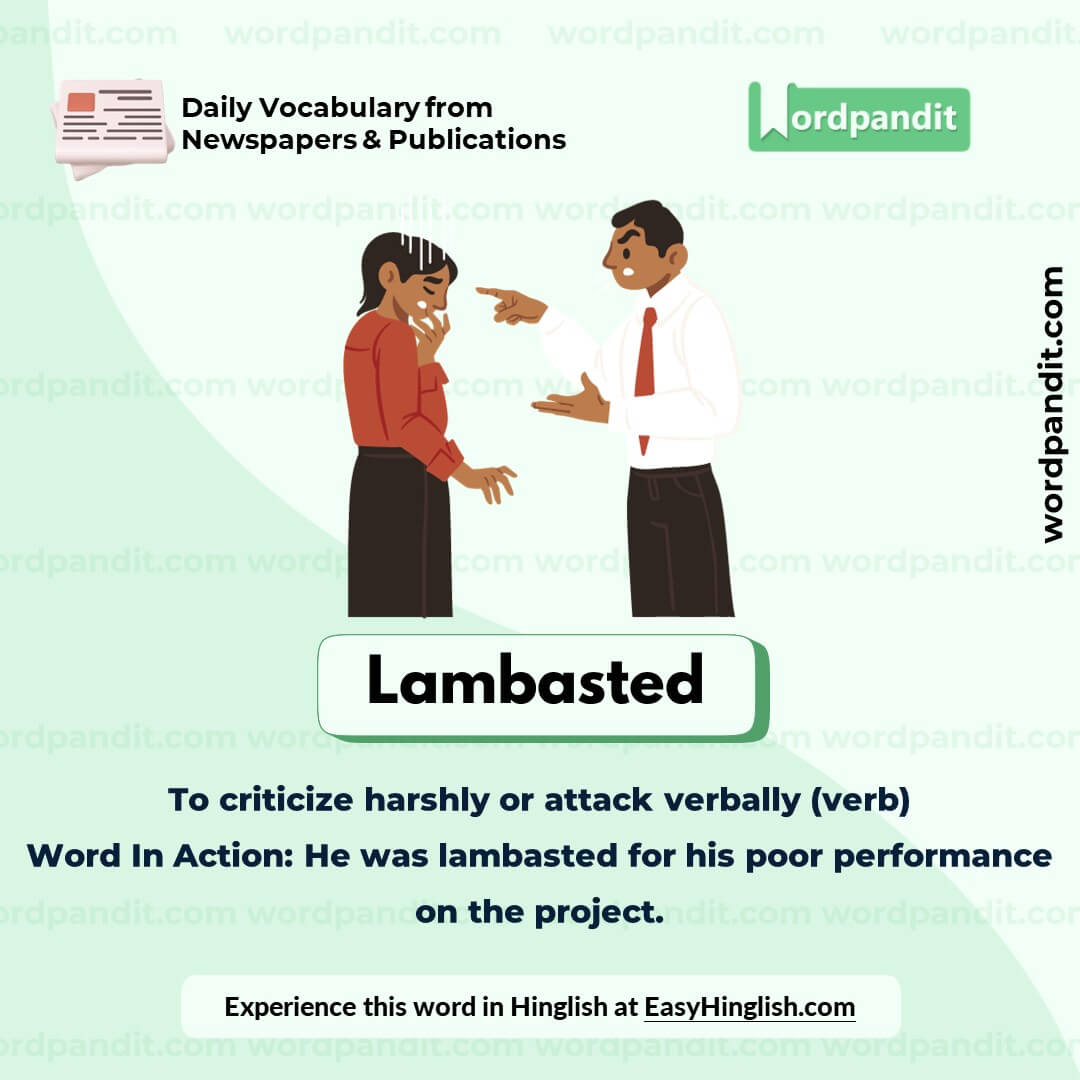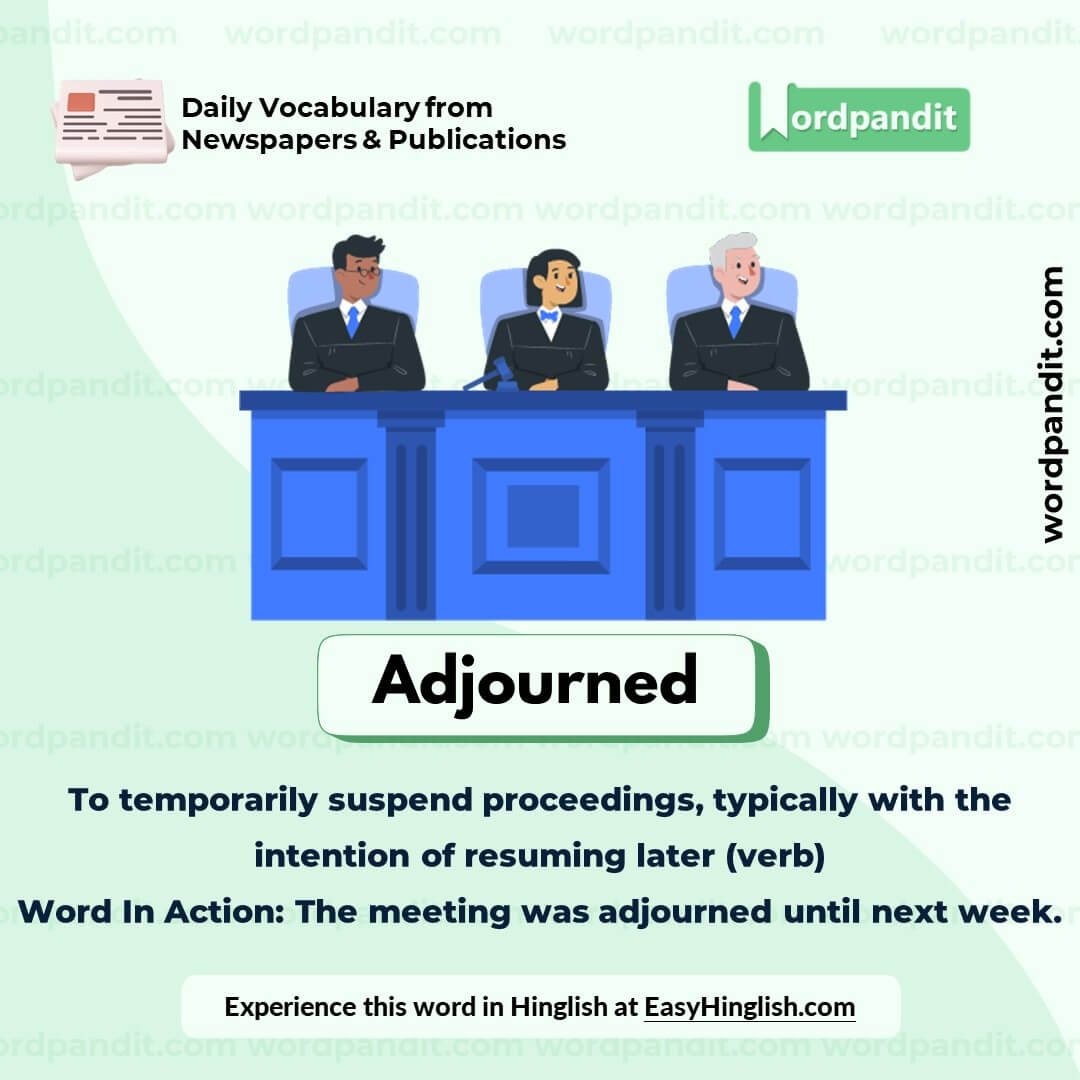Daily Vocabulary from Indian Newspapers and Publications
Welcome to Wordpandit’s Indian Vocabulary Hub
At Wordpandit, we understand the importance of staying rooted in the local context while expanding your language skills. This section focuses on enriching your vocabulary with words and phrases drawn from India’s leading newspapers and publications, ensuring you're learning vocabulary that is practical, relevant, and uniquely Indian.
Why Indian Sources Matter
We believe that the best way to master any language is by immersing yourself in local content. That’s why we carefully curate vocabulary from top Indian publications, including:
- The Hindu
- The Times of India
- The Economic Times
- Hindustan Times
- Live Mint
- The Indian Express
- And many others...
Stay Updated, Stay Relevant
With daily updates from Indian news sources, you’ll be consistently learning words that reflect the trends and shifts in Indian society and culture. Our focus is to provide vocabulary that enhances your understanding of the language in an Indian context.
How Wordpandit Supports Your Goals
Whether you’re preparing for exams, aiming to improve your professional communication, or simply want to stay connected with the latest Indian vocabulary, Wordpandit is here to guide you every step of the way.
Learn with a Practical Approach
Our interactive learning methodology includes real-world examples, engaging activities, and context-specific usage to ensure that every word becomes part of your active vocabulary.
Dive into Indian Vocabulary Today!
Why Choose Wordpandit?
Practical Learning: Focus on words you'll actually encounter in real-world reading, enhancing your comprehension and communication skills.
Diverse Content: From current affairs to scientific breakthroughs, our varied sources expose you to vocabulary across multiple domains.
Effortless Integration: Make Wordpandit a part of your daily routine. Just a few minutes each day can significantly boost your lexicon over time.
Your Path to Vocabulary Mastery
- Visit our Daily Vocabulary section regularly
- Explore new words and their usage in context
- Practice incorporating these words into your own writing and speech
- Track your progress as your vocabulary expands
Start Your Journey Today
Embark on your vocabulary enhancement journey with Wordpandit. By consistently engaging with our daily posts, you'll build a robust vocabulary that serves you well in academic, professional, and personal contexts.
Remember, a word a day keeps linguistic limitations at bay. Make Wordpandit your daily companion in the quest for vocabulary excellence!
WORD-1: Indecisiveness
Context:
"Turning his attention to the DK Brothers, Gowda mocked them as “unique brothers” and questioned their indecisiveness." - The Indian Express
Explanatory Paragraph:
Indecisiveness is the state of being unable to make a decision promptly or confidently. It often arises from uncertainty, fear of mistakes, or an overload of options. When someone is indecisive, they may struggle to commit to a course of action, leading to delays and potential frustration for others involved.
Meaning: The inability to make decisions quickly and confidently (noun)
Pronunciation: in-deh-SAI-siv-ness
Difficulty Level: ⭐⭐ (Beginner)
Etymology: Derived from the Latin word decidere, meaning "to decide," with the prefix "in-" indicating negation.
Synonyms & Antonyms:
Synonyms: hesitation, uncertainty, wavering, vacillation, irresolution
Antonyms: decisiveness, certainty, confidence, resolution, determination
Usage Examples:
- Her indecisiveness in choosing a major delayed her graduation by a year.
- Indecisiveness among the team members caused a delay in finalizing the project plan.
- He was criticized for his indecisiveness during the crisis, as it prevented timely action.
- To overcome her indecisiveness, she started practicing decision-making exercises.
Cultural Reference:
"Indecision may or may not be my problem." - Jimmy Buffett, in the song "Changes in Latitudes, Changes in Attitudes"
Think About It:
What are some common factors that make people feel indecisive, and how do you personally cope with difficult decisions?
Quick Activity:
Think of a recent decision you struggled to make. Write down the factors that contributed to your indecisiveness and how you finally made a choice.
Memory Tip:
Remember "indecisiveness" by breaking it down to "in-decision," or "not making a decision."
Real-World Application:
Indecisiveness is often observed in high-stakes environments, such as business or politics, where delays in decision-making can impact outcomes significantly.
WORD-2: Lambasted
Context:
"Gowda lambasted Congress over water supply projects. “They keep talking about Yettinahole water reaching Kolar and Chikkaballapur. If they actually manage this, I’ll bow before them,” Gowda challenged, denouncing Congress for what he called “blatant lies” to the people of the region." - The Indian Express
Explanatory Paragraph:
The word lambasted refers to severely criticizing or scolding someone or something. When a person lambastes another, they do so in a harsh, often public manner, expressing strong disapproval or anger over a perceived fault or wrongdoing. In the example, Gowda expresses strong criticism of Congress’s claims regarding water supply projects.
Meaning: To criticize harshly or attack verbally (verb)
Pronunciation: lam-BAST-ed
Difficulty Level: ⭐⭐⭐ (Intermediate)
Etymology: Originates from the late 17th-century English slang, where "lambaste" combined "lam," meaning to beat or strike, with "baste," meaning to thrash or scold.
Synonyms & Antonyms:
Synonyms: criticize, scold, berate, rebuke, chastise
Antonyms: praise, commend, compliment, laud, endorse
Usage Examples:
- The coach lambasted the players for their lack of effort during practice.
- The politician lambasted his opponent’s policies during the debate.
- She lambasted the company on social media for its poor customer service.
- The teacher lambasted the students for not completing their assignments on time.
Cultural Reference:
In media and politics, public figures often lambaste each other during debates and speeches to emphasize their criticisms, such as when talk show hosts lambaste certain policies or societal issues to voice disapproval and drive discussions.
Think About It:
What might be the effects of lambasting someone publicly versus privately? How might it impact relationships or public perception?
Quick Activity:
Think of a recent news story where a public figure lambasted another. Reflect on whether you think the criticism was justified and why.
Memory Tip:
Remember "lambasted" by associating it with "basting" someone with harsh words, like covering them in a heated critique.
Real-World Application:
In the workplace, using lambasting language in meetings or reviews can create a tense environment. Managers often strive to balance constructive feedback with firm critiques to avoid overly harsh criticism.
WORD-3: Amidst
Context:
"The resolution, which also expressed 'concern' over the 'unilateral removal' of the special status, was passed without any debate as the Speaker put it to voice vote amidst noisy scenes." - The Telegraph Online
Explanatory Paragraph:
The word amidst is a preposition that means "in the middle of" or "surrounded by." It’s used to describe being within a particular environment, often one filled with certain elements or emotions. In this context, it signifies that the resolution was passed during a chaotic scene, with noise surrounding the proceedings.
Meaning: In the middle of; surrounded by (preposition)
Pronunciation: uh-MIDST
Difficulty Level: ⭐ (Beginner)
Etymology: From Middle English amid, meaning "in the middle of," with the suffix "-st" for emphasis.
Synonyms & Antonyms:
Synonyms: among, surrounded by, in the middle of, within
Antonyms: outside, away from, beyond
Usage Examples:
- The garden was peaceful amidst the sounds of chirping birds and rustling leaves.
- She stood amidst the crowd, searching for her friend.
- The teacher remained calm amidst the students’ excited chatter.
- The leader made his speech amidst a wave of applause and cheers.
Cultural Reference:
Amidst is frequently found in literature and historical texts, often used to evoke imagery, as in "amidst the clamor of battle" or "amidst the grandeur of the palace."
Think About It:
How does the use of "amidst" change the tone of a sentence compared to words like "during" or "while"?
Quick Activity:
Write a sentence using "amidst" to describe a moment surrounded by activity or emotion, such as a celebration or an intense situation.
Memory Tip:
Remember "amidst" by thinking of "amid" as "in the middle," with the "st" emphasizing the presence within something.
Real-World Application:
“Amidst” is commonly used to describe environments where multiple things are happening, such as in journalism to depict events surrounded by chaos or in storytelling to create atmosphere.
WORD-4: Drubbing
Context:
"He says that the farmer is at the centre of these elections, and highlights that farmer’s issues are why BJP faced a drubbing in the Lok Sabha elections." - The Hindu
Explanatory Paragraph:
The word drubbing refers to a severe defeat or a harsh beating, often used in a competitive or political context to describe a significant loss. In the example, it conveys that the BJP faced a major loss in the Lok Sabha elections, attributed to farmers' issues.
Meaning: A decisive defeat, especially in a competition or election (noun)
Pronunciation: DRUB-ing
Difficulty Level: ⭐⭐⭐ (Intermediate)
Etymology: Derived from the 17th-century verb "drub," meaning to beat or thrash, likely of Arabic origin.
Synonyms & Antonyms:
Synonyms: thrashing, defeat, beating, trouncing, rout
Antonyms: victory, win, triumph, success, conquest
Usage Examples:
- The team suffered a drubbing in the championship match, losing by over 30 points.
- The candidate faced a drubbing at the polls, receiving less than half the expected support.
- The company took a drubbing in the stock market after the poor earnings report.
- Despite the drubbing in their first game, the players remained optimistic about the season.
Cultural Reference:
The term "drubbing" is often used in sports and politics to highlight the intensity of a defeat, such as when one team or candidate overwhelmingly defeats another.
Think About It:
What strategies do you think are effective for overcoming a drubbing in a competitive field? How can one recover and come back stronger?
Quick Activity:
Write about a historical or sports event where one side faced a significant drubbing. What were the main factors that led to this outcome?
Memory Tip:
Think of “drubbing” as "drum" + "beating" — a thorough beating that makes a lasting impact, just like the sound of a loud drum.
Real-World Application:
In the business world, “drubbing” can describe poor financial quarters or sharp drops in stock prices. It underscores the competitive challenges that organizations face.
WORD-5: Adjourned
Context:
"The assembly later passed the resolution following which the House was adjourned by the Speaker for 15 minutes." - The Wire
Explanatory Paragraph:
The word adjourned refers to the act of temporarily pausing or suspending a meeting or session, with plans to resume it at a later time. In legislative or formal contexts, an adjournment usually signals a scheduled break. Here, it means that the Speaker paused the House session for a 15-minute recess.
Meaning: To temporarily suspend proceedings, typically with the intention of resuming later (verb)
Pronunciation: uh-JURND
Difficulty Level: ⭐ (Beginner)
Etymology: From the Old French ajourner, meaning "to put off to another day."
Synonyms & Antonyms:
Synonyms: suspend, pause, recess, postpone, delay
Antonyms: continue, resume, proceed, reconvene
Usage Examples:
- The court session was adjourned until the following week.
- After a long debate, the committee adjourned the meeting for a lunch break.
- Due to technical issues, the conference was adjourned until further notice.
- The board meeting was adjourned after all agenda items were discussed.
Cultural Reference:
In popular media, courtroom dramas often feature the word “adjourned,” marking a break in legal proceedings. Judges use it to indicate the end of a session until it resumes later.
Think About It:
How might the timing of an adjournment affect the decisions and discussions that follow when the meeting resumes?
Quick Activity:
Imagine you are chairing a meeting. List three scenarios where it would be beneficial to adjourn the meeting temporarily and explain why.
Memory Tip:
To remember "adjourned," think of "a journey" paused halfway, with plans to continue it later.
Real-World Application:
In business and government, “adjourned” is frequently used to manage time, giving participants a break to reflect, discuss, or prepare for the next phase of a meeting or session.


















